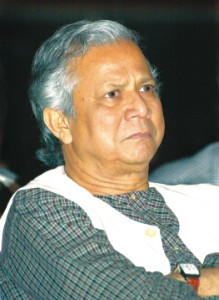|
Politics
The Politically Departed?
Nader Rahman
 Thursday May 3, was more than just the last day of the week; Professor Muhammad Yunus also brought his brief political journey to an end as well. It started with a bang and ended with a whimper and the ride was anything but uneventful. Thursday May 3, was more than just the last day of the week; Professor Muhammad Yunus also brought his brief political journey to an end as well. It started with a bang and ended with a whimper and the ride was anything but uneventful.
The beginning has often been interpreted as his open letter to the nation, where he asked for their opinions, but his political ambitions were simmering well before the letter. Almost as soon as he won the Nobel Prize his voice gained volume as he repeatedly requested, “clean candidates' to take to the next elections. That was soon followed by the October riots and killings. In those uncertain times it could be said the nation looked to him to provide a way out of the mess. Yet he was still mute on the topic of “joining” politics. At the same time he freely commented on all things political including his famous “A+” grading for the previous caretaker government.
As the political situation worsened in the country he became more of a viable option, it all finally boiled over on February 11, when he wrote his first letter. It was an open letter to the nation, and unsurprisingly it created a buzz. He wrote “I, like you, witnessed where our political culture has brought the country and how it attempted to destroy the country's future possibilities.” Yunus emerged as the savior of Bangladesh, while he did not promise he would turn the country around, he made it clear that the least he could do was try. “I need your advice on how I should go forward.” He said, and apparently he got it.
The first letter was a feeler, trying to judge public opinion, while the second letter was the big one. On February 22, he wrote to the public again, this time it was announce his entry into politics. He had officially started a long walk that would take him from micro-credit guru to politician. He had even come up with a name for his new party, although it was never finalised it seemed that the power of the citizens or Nagorik Shakti would soon be a major political player. The wave of euphoria that brought him his success was to just be just that, a wave, which would eventually recede. While Bush talked of troop “surges” in Iraq, Yunus rode his wave for all that it was, what no one realised was they were both temporary.
Yunus next started by building a structure for his party, a structure that was eventually built on his words but was not backed up by the actions of those who requested him to join the fray. His politicking went on without much publicity as he continued with his frequent trips around the world. For a few months not much was heard from him as the caretaker government continued with their ban on indoor politics. This was a little bit of gray area as some saw his formation of a political party during the emergency as an infringement of the ban on indoor politics. One could say he was on shaky ground.
Then came his announcement on the 3rd of May, in his third open letter to the nation he officially announced that he was standing aside from his attempt to form a political party. He said, “I have seen those who initially encouraged me gradually losing their enthusiasm.” It was telling tale than even Bangladesh's most celebrated personality and all round do gooder could not cut it in our political scene. His third and final letter was a solemn affair, as the man who hoped and wished so much for the nation gave up his personal ambition to take the country forward. Who is to blame, if any? That is a tricky question to answer. Whatever happens Professor Muhammad Yunus should not be lost to the country, he can now take over a different role, becoming something of a father figure to the nation. He has raised himself above politics and most will say rightly so. Many have come and gone in the political sphere of Bangladesh, with Muhammad Yunus's political death he has left behind the recurrent question: what now?
Copyright (R) thedailystar.net 2007 |
